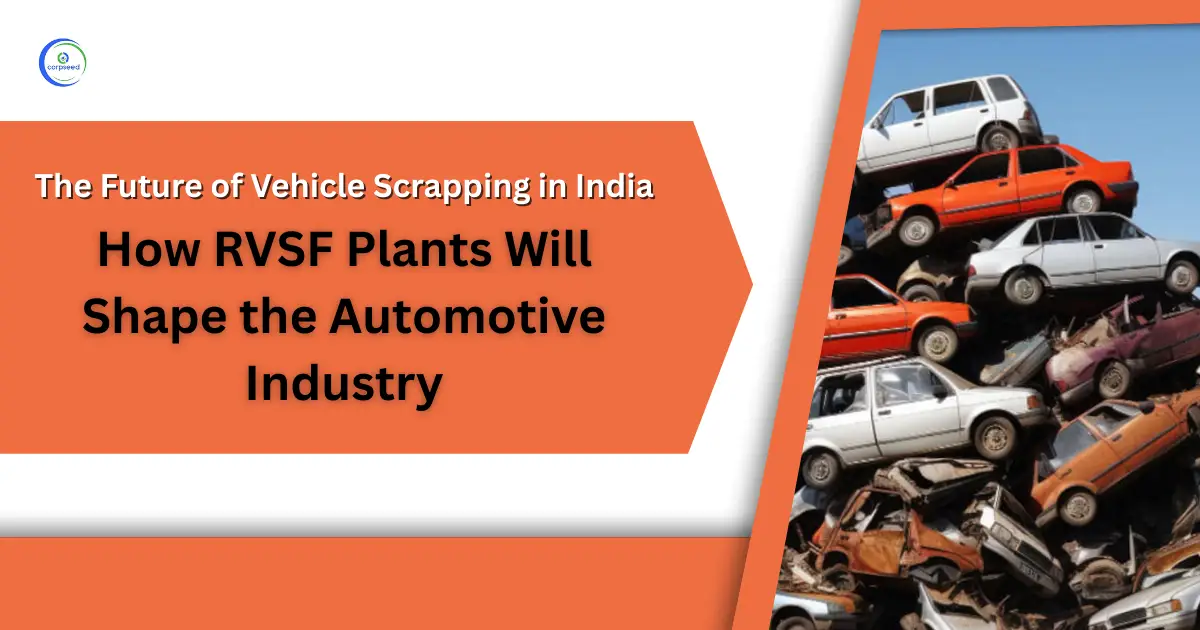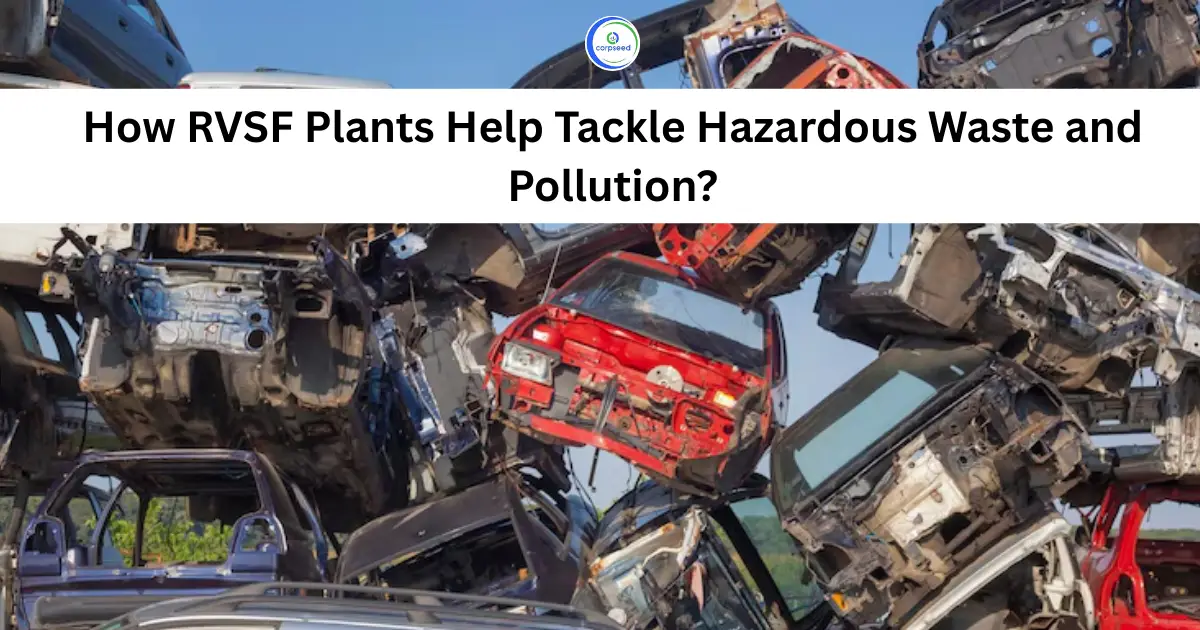The requirement of sustainable practices for waste management has become a priority for all industries in India. An important part of this process is the regulation of end-of-life vehicles (ELVs), which form a large component of waste generation. For addressing this problem, the government has launched the Registered Vehicle Scrapping Facility (RVSF) license, which is an important part of how vehicle recycling should be done responsibly.
Table of Contents
What is an RVSF License?
The Registered Vehicle Scrapping Facility (RVSF) license is granted by the government to those facilities that process the scrapping, dismantling, and recycling of end-of-life vehicles (ELVs). As more and more vehicles come to the end of their lifespan, it becomes necessary to have regulated and authorized facilities to deal with these vehicles in an environmentally friendly way. The RVSF license ensures scrapping and recycling are performed according to government regulations, supporting green practices and minimizing environmental pollution.
--------------Blog Contact Form-------------
Why is the RVSF License Important?
The Registered Vehicle Scrapping Facility (RVSF) license is important for businesses involved in the vehicle scrapping and recycling industry in India. It confirms that the process of dismantling and recycling end-of-life vehicles (ELVs) is performed in a controlled, safe, and environmentally friendly manner. Some of the key reasons for obtaining the RVSF license are:
- Regulatory Compliance: RVSF licensing guarantees that your vehicle scrapping and recycling unit complies with all the regulatory requirements specified by the government for the treatment of ELVs. This guarantees that your unit functions within the bounds of the law and follows environmental regulations.
- Environmentally Friendly: Accurate scrapping and recycling of ELVs ensures the recovery of valuable materials such as steel, copper, aluminium, and other metals, lessening the environmental burden of such materials being deposited in landfills. The RVSF process ensures the proper disposal of hazardous materials such as oil, lead-acid batteries, and mercury, which are detrimental to the environment.
- Boost to the Circular Economy: By scrapping and recycling vehicles, the recovered materials from ELVs can be reused, supporting the circular economy. The RVSF license allows companies to be part of this eco-friendly process, thus promoting green practices.
- Business Boost: As the government encourages environmentally friendly vehicle recycling, an RVSF license can enhance your reputation and bring more business from car companies, government agencies, and vehicle owners seeking legal and approved facilities for scrapping their old vehicles.
Also Read: How RVSF Plants Help Tackle Hazardous Waste and Pollution
Steps to Obtain the RVSF License for Your Facility
In order to establish a vehicle scrapping and recycling unit and acquire the RVSF license, you will have to follow a chain of steps. Following is a step-by-step guide to guide you through:
- Eligibility Check: Before applying for an RVSF license, your business must ensure that it has the required eligibility criteria. These generally include:
- Proper infrastructure for scrapping, dismantling, and recycling vehicles being available.
- A skilled labour force educated in environmentally safe and sound vehicle disposal practices.
- Proper machinery and equipment for ELV dismantling and recycling.
- Register Your Business: In order to get an RVSF license, your company should be registered under the appropriate legal system. This may be as a company or a partnership firm. Make sure your company is in accordance with all the legal and tax requirements before applying for the license.
- Environmental Clearance: As scrapping and recycling cars entail handling of toxic substances, environmental clearance becomes essential. It will involve measuring your facility's environmental, air, and water impact. Your business will be required to comply with Pollution Control Board norms and prove that your facility uses environment-friendly disposal methods.
- Documentation Preparation: Prepare the essential documentation, which may include:
- A comprehensive plan for your vehicle scrapping and recycling plant, covering layout, processes, and equipment.
- Documentation of land ownership or lease contract of your facility.
- Full waste management plan, how the hazardous materials will be handled, etc.
- Certification of adherence to safety requirements and environmental legislation.
- Submit Application to the Concerned Authority: Submit your application to the Ministry of Heavy Industries and Public Enterprises or the proper regulatory agency. With your application, include all the documents necessary, such as your business registration, environment clearance, facility plan, and safety standards.
- Inspection by Authorities: After submitting your application, the government authorities will inspect your vehicle scrapping and recycling plant. They will confirm that your plant meets all safety and environmental regulations. During their inspection, they will inspect your equipment, security measures, waste management system, and regulatory compliance.
- Obtaining the RVSF License: Once the inspection is successfully carried out, and the authorities verify that your facility is align with all the regulations, you will be issued the RVSF license. This license will make your business legally recognized as a Registered Vehicle Scrapping Facility (RVSF).
Key Requirements for Operating an RVSF Facility
In order to effectively acquire and sustain this license, your facility should fulfil specific requirements. Following are the primary requirements for operating an RVSF facility:
- Appropriate Infrastructure: The plant should be well furnished with the appropriate infrastructure for safe dismantling of automobiles. This includes shredding units, crushing units, and adequate storage facilities for hazardous substances.
- Trained Workforce: The staff needs to be trained in handling the different parts of ELVs, such as dangerous substances like oils and batteries, in order to comply with safety standards.
- Waste Management: You need to have a proper waste management system for recycling valuable materials like metal, plastic, and rubber, and disposing of hazardous materials safely.
- Environmental and Safety Standards: The plant should comply with environmental and safety standards prescribed by regulatory agencies such as the Central Pollution Control Board (CPCB) and local authorities.
Conclusion
In conclusion, acquiring the RVSF license for your vehicle scrapping and recycling business is an important step towards making your business legally compliant, environmentally friendly, and sustainable. By adhering to the steps outlined and meeting all regulatory standards, you will be in a position to operate a legally recognized and environmentally friendly business that helps in the safe disposal and recycling of end-of-life vehicles (ELVs).
As India is becoming more and more interested in sustainable methods and vehicle recycling, the need for certified Registered Vehicle Scrapping Facilities (RVSF) is likely to grow. By availing the license, your company not only contributes to the establishment of a circular economy but also supports the government's vision of a cleaner future.
This portion of the site is for informational purposes only. The content is not legal advice. The statements and opinions are the expression of author, not corpseed, and have not been evaluated by corpseed for accuracy, completeness, or changes in the law.
BOOK A FREE CONSULTATION
Get help from an experienced legal adviser. Schedule your consultation at a time that works for you and it's absolutely FREE.









